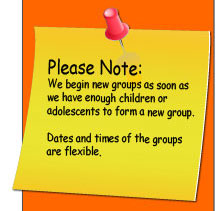February 2009 - Volume 41 |
|
| Helping Children and Adolescents Succeed Socially! | |
| The Social Skills Groups |
|
Help your child to develop ways to Self-Regulate = (self-control) and they will attract friendships and success into their lives. The capacity for Self-Regulation is important core strength and it will help your child in many ways. The ability to Self-Regulate ourselves and our behaviors is the same thing as self-control. It develops and matures as we grow as individuals. Basically speaking, this core strength is the ability to think before we just act. When a child does not develop the capacity to Self-Regulate they will have problems making and keeping friends, learning in school, and controlling their behavior. As young children grow, they gradually learn to shift needing so much support from their parents and teachers in helping them to sooth their own distress and discomforts (e.g. hunger, fatigue, stress and frustrations) to achieving this for themselves. When children learn to tolerate some distress they will turn to their own internal rules of ideas of appropriate behaviors and choices. In addition, they will become more thoughtful and much less reactive and impulsive. According to Dr. Barkley, the critical deficit associated with ADHD is the failure to develop “self-control. “ This is because of biological reasons and not parenting styles. But other times, parents unknowingly model poor self-control at home. Some examples of this are when they blurt out thoughtless angry and hurtful remarks to their children, or hit their child. We need to be in control of our reactions in order to set the best examples of behavior to our children. We need to respond appropriately. Some parents may think hitting their child is appropriate, but I assure you it is not. The ability for the child to Self–Regulate is the core of their behavior choices and it will help to improve their frustration tolerance, anger, aggression and anti-social behaviors. What can we do to help our children to Self-Regulate?
-- Susan Stern, LCSW is the founder of The Social Skills Place, Inc. Some ideas learned from David Rabiner, Ph.D. Duke University, Dr. Bruce Perry, M.D., Ph.D. International authority on brain development and Dr. Russell Barkley Ph. D., Authority on ADHD. |
| The Social Skills Place, Inc. :: 310 S. Happ Rd, Suite 201 :: Northfield, Illinois 60093 Office 847 446-7430 :: Cell 847 507-8834 :: www.socialskillsplace.com |
|
| (C) 2006-2021 :: All Rights Reserved :: Unsubscribe from our mailings |
